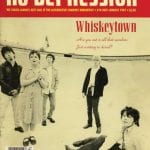Songs: Ohia – Dateline: Pluto
When Songs: Ohia performs live, it feels a lot like church. On a four-dog night last February, the front half of the congregation flocked to the Second Story stage front as if to watch a snake-handler and await a healing.
But instead of wrestling serpents and spouting sermons, vocalist Jason Molina tenderly plucked a tenor guitar and warbled sensuous lines like “She comes to me and she’s as handsome and as wild as a hawk.” Yet Molina’s songs, some as slow as erosion, are lost on the back half of the rock crowd, where the singer’s dark, bushy eyebrows are the only thing visible through the smoke, and a guy talks too loudly about his new job picking up sticks at the golf course.
No big deal, Molina seems to say with his eyes. I’ll convert them later. Although Songs: Ohia has staked territory on Pluto in the country music solar system, Molina, 23, believes traditional crowds can appreciate even his most abstract songs, if only for their organic sound. “We don’t pretend it’s 1945,” he explains. “But if you grew up listening to music from the late 1950s, like the sound of Sun records, you can hear what the instruments are doing.”
He cautions, however, this isn’t music to wash dishes by. “This is extremely intense listening. It’s really active music because the arrangements are so strange,” Molina adds, referring to an unexpected horn part or organ blast. “Each song sets up a new sound, a new problem to solve.”
In 1995, after the Palace Brothers’ Will Oldham nabbed some of the band’s demos, he released their first (and now out-of-print) single, “Soul” b/w “Freedom”, on Palace/Drag City. Last year, Bloomington, Indiana, label Secretly Canadian issued a follow-up 7-inch before releasing Songs: Ohia’s self-titled full-length this spring.
With guitarist-banjoist Mike McCartney and guitarist-drummer Todd Jacop in tow, Molina borrowed reedsman Peter Hess from the Tommy Dorsey Orchestra for his bass clarinet, tenor saxophone and organ work. “He has an absolute drive to play,” Molina says of Hess, a longtime friend. “But on this record he plays really sparsely. His stuff takes the place of a fiddle.”
Producer Eoin Russell recorded Songs: Ohia in different rooms of a turn-of-the-century mansion, the band huddling around a microphone as if it were a campfire. Each room’s history seems to bleed onto tape, adding personality while stripping each song to its truest wood. On “White Sulfur”, you can hear the hardwood floor absorb Molina’s voice, then hand it back to him a little cleaner than when it left his mouth. A banjo races like a teletype on “Cabwaylingo” as Molina, in a flute-edged tenor reminiscent of Phil Ochs, trills, “Dance the smell of rope through pulleys singing.” Hess adds steam to “Blue Jay” when his bass clarinet rushes in like the sound of heat when it just comes on. A dark, rich organ percolates in the background of “Crab Orchard”, but the record reaches full boil during “Our Republic” when guitar, bass, banjo, drums and clarinet actually send the volume meters into the red.
Although Songs: Ohia is indeed a band, Molina is its center, its life force. Out of town, he often performs solo if his players can’t make the show because they have go to work the next day. On record, the members might spend more time in a grocery line than they do laying down their parts. “Basically they come in and they learn the songs in 5 to 10 minutes. We record it, then we go back to our lives,” explains Molina, who often treks to West Virginia to search for graves of Civil War soldiers.
Life for Molina revolves around his current digs in Cleveland, which he describes as “a rough musical town, somewhere between the Michael Stanley band and late 1980s heavy metal.” But as for his homestead, West Virginia, “It’s heaven, as John Denver says,” Molina states with a granite-like face. Then, unable to contain the joke, he adds, after a long pause, “Although that guy doesn’t know anything.”
(Secretly Canadian Records)




